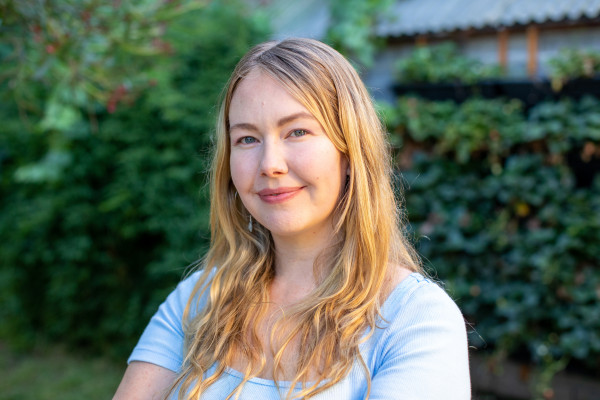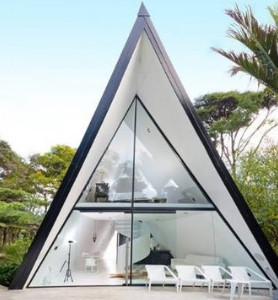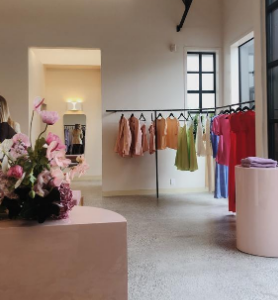Talking climate action with Lily Dempster - app founder of One Small Step
The ongoing climate crisis is a topic on everyone’s minds, and when it comes to implementing better habits to minimise our carbon footprint, it can become overwhelming very fast. One Small Step is a free mobile app that helps people achieve zero emissions through lifestyle changes, and helped CEO and founder, Lily Dempster, become a finalist in the empowering Cartier Women’s Initiative after its recent expansion to Oceania this year. Before she jetted off to Paris for the finals, we were lucky enough to speak to her about the benefits of mass decarbonisation of society via behaviour change, how One Small Step lends a helping hand when it comes to your impact, and what it’s like to work with luxury Maison, Cartier. Read on for more. 
Where did the inspiration come from to create your app?
I've worked in the climate movement for over a decade and I was concerned about it from early University when it was clear that the impacts of climate change are very unfair - the people least responsible for causing the problem are the ones worst affected. Getting people to change their behaviour and change consumer demand is a critically important part of the fight against the climate crisis, and also a badly under-addressed area, and I realised this when I was running certain campaigns as a marketing director of a national advocacy group in Australia, getting people to switch to renewable energy electricity providers online, the impact that those campaigns had and how fast the impact was, was what initially motivated me to switch over to this type of community-based demand-side campaigning rather than the top-down political reform that I'd done previously.
What are some of the biggest milestones you’ve experienced thus far with One Small Step?
The biggest achievement for me is that we've built a tool that reliably supports people to reduce their carbon emissions. We've had 70,000 downloads in Australia, and those who are using the product have saved over 8000 tonnes of carbon emissions through lifestyle changes - that’s the equivalent of planting around 130,000 trees.
Are there any sub-categories in the app that you think are particularly impactful e.g. information about people's banks or better habits to implement through your diet?
This is why I love our product because it depends on the person and the leverage that's available to them in their own lives. If you're a homeowner, you can do a lot with the installation of solar, but if you're a renter, you’re prevented from doing that, so it depends on the person and their specific circumstances in terms of what's going to be most impactful for them, and that's what the app helps people figure out generically.
Cartier is such an incredible company - how has it been being part of their Women’s Initiative and being recognised as a company that aligns with their ‘Forces for Good’ theme?
It's been wonderful; I'm a sole founder, and I'm a woman, and that can be isolating. There's a good startup ecosystem in Australia and New Zealand, but running an impact-focused initiative is not the same as running a startup. There are way more constraints in terms of how you operate; we won't work with a whole bunch of different groups and we set a high bar with who we partner up from a revenue standpoint because we're only going to support businesses that support people to reduce emissions, and that's quite a small cohort. So just getting to be in a network and a community of other women that have the same set of opportunities, problems, constraints, and challenges, and being able to support one another and share lessons is fantastic. The Cartier Women's Initiative is high calibre in terms of the coaching and support that they provide - I've benefited a lot from the fellowship already.
And entrepreneurial women overall are starting to achieve their well-deserved limelight, finally, how has your experience been trailblazing through a typically male-dominated line of work?
This is the tough thing about the gender topic and entrepreneurship - it's not super obvious. For example, with access to venture funding, only 3% went to women-founded businesses last year which is nuts! Usually, if people are making decisions about whether to support you financially, or whether to back you, they're not consciously thinking “I don't want to support this person, because they're a woman,” it’s this subtle, unconscious bias about supporting people that reminds you of yourself. I've still received a huge number of advantages because I live in a wealthy country, I've got a university education and I’m white. Of course, gender is one of the potential disadvantages for me in that world, but it would be so much harder for women of colour so I think everyone has a range of advantages and disadvantages, and I'm in a position of huge privilege to be able to do what I'm doing.
Whilst New Zealand waits in anticipation for the release of One Small Step here, what are some of the best things for us to introduce into our daily routine to minimise our carbon footprint?
A practice of mindfulness can be really helpful. When we're tired, rundown and taking shortcuts, that’s when we go for the cheapest and easiest option, which is typically the least sustainable, usually using a lot of plastic and creating a lot of waste. Being integrated within your community as well - so rather than buying a lawnmower, ask your neighbours if you can borrow theirs, or instead of buying everything new, tap into gift economies online. My key message is that you're more powerful than you realise, and we all have influence and control over the climate crisis. I think political participation is critical, but so are your own choices, especially when you come from a country that's wealthy like New Zealand or Australia. We need everybody mobilising, and we need massive community mobilisation so we can all do our part.
The 2023 Cartier Women’s Initiative Awards Ceremony is now accepting applications for the 2024 edition until June 30, 2023.





